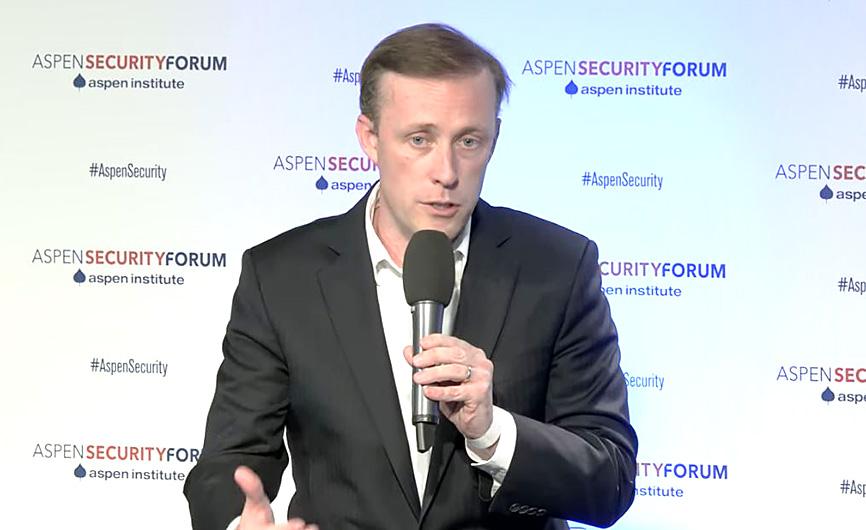The US’ policy is to help Taiwan focus on obtaining the capabilities it needs the most to repel a possible Chinese attack and not the weapon systems it is accustomed to having, a senior US official said on Friday.
US National Security Adviser Jake Sullivan made the remark at the Aspen Security Forum in Colorado after being asked if US President Joe Biden’s “porcupine strategy” has prepared Taiwan to defend itself “right now.”
“We are focused on those capabilities that are going to be most useful in the kinds of contingency we can expect, and not just rely on systems that... [Taiwan has] had around for a very long time,” he said.

Photo: Screen grab from the forum’s video footage
Asked whether Russia’s war in Ukraine could drain the US’ supply of arms to Taiwan, Sullivan said that there are “some overlaps” in the weapons systems required by the two situations.
However, a major contrast exists between Taiwan and Ukraine due to “the nature of the contingency or conflict [being] quite different from [a] land war in Europe and a potential contingency or conflict across the Taiwan Strait,” he said.
Washington’s continued support of the two countries would require increased investment, workforce development and an emphasis on bolstering the supply of key components and weapon systems, he said.
The Ukraine war has not prompted Beijing to fundamentally rethink its approach to Taiwan, but it has learned some concerning lessons about invading another country, he said.
However, Taiwan is also “working rapidly” to learn about mobilization, territorial defense and information warfare from Ukraine, he said.
Asked whether Biden’s statement in May that the US would defend Taiwan represents a shift in Washington’s policy, Sullivan said: “The president said in Japan that our policy has not changed, that we maintain a policy of strategic ambiguity, and we do.”
“Ambiguity has to be a feature of strategy in certain contexts, particularly very complex concepts,” he said. “I will stand to defend that idea conceptually.”
The US’ stance on its relationship with Taiwan continues to governed by the one China policy,” the Three Joint Communiques, the “six assurances” and the Taiwan Relations Act, he said.
Regarding competition between the US and China, Sullivan said that the US has become “well-positioned” to deal with that challenge, as the Biden administration has taken measures to bolster alliances in the Indo-Pacific region, Europe and the Middle East.
“The last thing I would say on [Beijing] ... is, it is never a good bet to bet against the US,” he said.
“If you look at the headwinds China is facing from the point of view of economic challenges, its continued effort to deal with the zero-COVID policy, I think there are real questions about what exactly its trajectory is going forward,” he added.

ENDEAVOR MANTA: The ship is programmed to automatically return to its designated home port and would self-destruct if seized by another party The Endeavor Manta, Taiwan’s first military-specification uncrewed surface vehicle (USV) tailor-made to operate in the Taiwan Strait in a bid to bolster the nation’s asymmetric combat capabilities made its first appearance at Kaohsiung’s Singda Harbor yesterday. Taking inspiration from Ukraine’s navy, which is using USVs to force Russia’s Black Sea fleet to take shelter within its own ports, CSBC Taiwan (台灣國際造船) established a research and development unit on USVs last year, CSBC chairman Huang Cheng-hung (黃正弘) said. With the exception of the satellite guidance system and the outboard motors — which were purchased from foreign companies that were not affiliated with Chinese-funded

PERMIT REVOKED: The influencer at a news conference said the National Immigration Agency was infringing on human rights and persecuting Chinese spouses Chinese influencer “Yaya in Taiwan” (亞亞在台灣) yesterday evening voluntarily left Taiwan, despite saying yesterday morning that she had “no intention” of leaving after her residence permit was revoked over her comments on Taiwan being “unified” with China by military force. The Ministry of the Interior yesterday had said that it could forcibly deport the influencer at midnight, but was considering taking a more flexible approach and beginning procedures this morning. The influencer, whose given name is Liu Zhenya (劉振亞), departed on a 8:45pm flight from Taipei International Airport (Songshan airport) to Fuzhou, China. Liu held a news conference at the airport at 7pm,

GRIDLOCK: The National Fire Agency’s Special Search and Rescue team is on standby to travel to the countries to help out with the rescue effort A powerful earthquake rocked Myanmar and neighboring Thailand yesterday, killing at least three people in Bangkok and burying dozens when a high-rise building under construction collapsed. Footage shared on social media from Myanmar’s second-largest city showed widespread destruction, raising fears that many were trapped under the rubble or killed. The magnitude 7.7 earthquake, with an epicenter near Mandalay in Myanmar, struck at midday and was followed by a strong magnitude 6.4 aftershock. The extent of death, injury and destruction — especially in Myanmar, which is embroiled in a civil war and where information is tightly controlled at the best of times —

Taiwan was ranked the fourth-safest country in the world with a score of 82.9, trailing only Andorra, the United Arab Emirates and Qatar in Numbeo’s Safety Index by Country report. Taiwan’s score improved by 0.1 points compared with last year’s mid-year report, which had Taiwan fourth with a score of 82.8. However, both scores were lower than in last year’s first review, when Taiwan scored 83.3, and are a long way from when Taiwan was named the second-safest country in the world in 2021, scoring 84.8. Taiwan ranked higher than Singapore in ninth with a score of 77.4 and Japan in 10th with